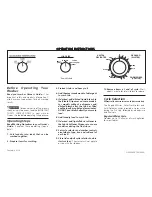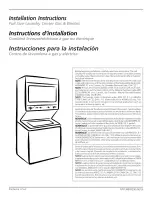
1
REMOVE
THE EXISTING SASH
Note: Remove the new window from its packaging.
Inspect and measure the new window to confirm it will fit
into the opening prior to removing the existing window.
The window needs to be 3/8" smaller in both width and
height than the pocket frame, i.e. existing sash opening.
A.
Remove the existing sash.
This will vary per manufacturer
of the existing window. Removing the hinge and operator
fasteners will generally allow the sash to be removed from
the existing frame.
Note: Two or more people may be required when
handling existing sash.
B.
Remove operator hardware and all head, jamb, and sill
stops.
This can usually be accomplished with a prybar.
SILL STOP
HEAD STOP
JAMB STOPS
1B
2
OPENING PREPARATION
A.
Inspect the existing window frame
and repair or replace
any defective or rotted wood parts. Remove or seat any
nails.
B.
Clean the opening of any dirt, debris, or excess
old paint before proceeding.
Chisel off any high
spots.
C.
Apply one piece of sill flashing tape to the sill of the
existing window frame.
Cut the tape 12" longer than
the existing window sill width. Apply the tape on the
existing sill 6" up each jamb and press down firmly. The
tape will not cover the sill depth completely under the
new window.
D.
Install and level sill shims.
Place 1” wide by 1/4” thick
shims on the bottom of the window opening 1/2” from
each side. Keep shims back 1/2" from interior face of
window. Shims are required at points where windows
are joined in multiple window applications. Add shims
as necessary to ensure the sill is level. Once level,
attach spacers to prevent movement.
Note: Improper placement of shims may result in
bowing the bottom of the window.
2B
2C
6“
































